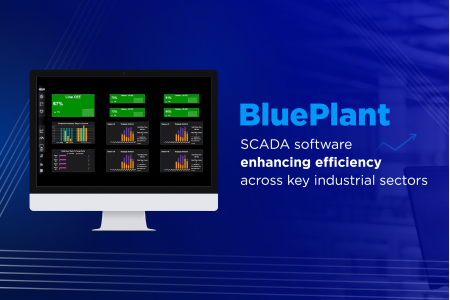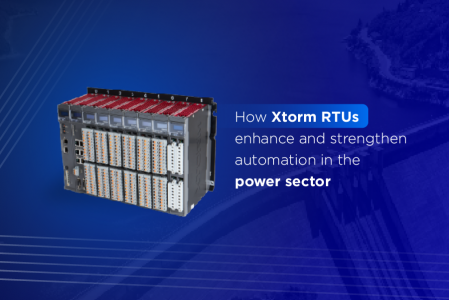Industrial automation is constantly driven by the need to optimize processes, boost productivity, and ensure high levels of safety and operational efficiency. In this demanding context, Altus presents the G Series, a new series of remote I/O systems designed to meet the requirements of cutting-edge industrial plants with high technology.
Featuring a flexible, smart, and highly adaptable architecture, the G Series stands out for its exceptional scalability, ease of maintenance, and support for multiple communication protocols. These capabilities make the G Series remote I/O systems a reliable and versatile solution, capable of operating in a wide range of complex industrial environments — from manufacturing and automotive to critical energy and infrastructure applications.
Versatile communication and cross-platform compatibility
One of the key technical advantages of the G Series is its broad support for a wide range of communication protocols. Its network adapter units (or network heads) are compatible with several industry-standard protocols, including MODBUS TCP, EtherNet/IP, PROFINET and EtherCAT. This level of versatility ensures high interoperability, allowing seamless integration with existing plant architectures regardless of the underlying technological platform.
Ruggedness and operational reliability
In industrial environments, particularly in mission-critical applications, operational safety is a top priority. With that in mind, the G Series was engineered to deliver high reliability, combining smart installation features with a rugged design.
Each module is equipped with dedicated locking mechanisms for secure mounting on DIN rails, ensuring mechanical stability and reducing risks related to vibration, accidental displacement, or connection failures. This contributes to maintaining system integrity under demanding conditions.
Additionally, strategically positioned front-facing LED indicators provide clear visual feedback on power and operational status, allowing for quick fault detection and streamlined diagnostics and maintenance. This helps minimize downtime and ensures consistent, uninterrupted operation.
High performance with a wide range of modules
The flexibility of the G Series lies in its extensive portfolio of available modules, covering digital, analog, and special I/O options. The digital modules come in various configurations: 8, 16, or 32 channels, with both Sink and Source options, and include integrated diagnostics to facilitate fault management and troubleshooting.
Analog modules, on the other hand, offer precise measurements for current, voltage, and temperature (supporting both RTD sensors and thermocouples). The line also includes dedicated modules for load cell applications and alternating current (AC) measurements. These modules are engineered for demanding industrial scenarios where accuracy and reliability are critical to maintaining process stability.
In addition, the G Series includes special-purpose modules for advanced applications, such as serial communication interfaces, incremental encoders, stepper motor control, pulse output, and HART protocol support—an essential feature for smart field instrumentation. These modules are ideal for special use cases in industries such as petrochemical, pharmaceutical, food processing, and critical infrastructure.
The series includes:
- Power supply modules for the backplane.
- Fieldbus head units (MODBUS TCP, EtherNet/IP, PROFINET and EtherCAT).
- Digital input/output modules.
- Analog input/output modules.
- 2-channel load cell measurement modules.
- 1-channel three-phase measurement modules.
This broad selection enables customized configurations for any application, offering the flexibility required for new installations as well as upgrades or expansions of legacy systems. As a result, the G Series stands out as a powerful, scalable solution, ready to meet the evolving challenges of modern industry.
Easy installation and simplified maintenance
One of the key factors for the success of industrial automation solutions is ease of installation and maintenance, enabling quick module replacement and expansion with minimal disruption to production processes. The G Series was designed with this practicality in mind. The modules are extremely compact, starting at just 12 mm in width, while the network adapter units begin at 42 mm, optimizing panel space and simplifying cable management.
Maintenance is streamlined using removable terminal blocks (RTB) with cable-retaining rings. These connectors allow for fast, secure wiring, greatly facilitating both initial setup and ongoing maintenance tasks. The G Series also offers impressive scalability, supporting up to 63 modules per system, making it ideal for applications that require expansion as production demands grow.
Moreover, the G Series features an internal backplane with an ultra-fast communication rate of 1 ms, ensuring near-instantaneous module response times. This enhances performance in time-sensitive processes that require high-speed communication and operational precision.
Applications of Remote I/O in smart automation
Remote I/O systems play a crucial role in today’s smart automation landscape, where the decentralization of control and data acquisition functions are increasingly valued. By enabling seamless integration with distributed sensors and actuators across the plant, I/Os remotes support the development of distributed architectures that enhance flexibility, lower installation costs, and provide powerful diagnostic and remote maintenance capabilities.
Typical applications include advanced supervisory systems (SCADA), automated assembly lines in smart factories, utility systems control and monitoring (such as water treatment and power distribution), as well as mission-critical operations that demand fast response times and high safety standards, such as in the petrochemical, power generation, and automotive industries.
Thanks to their adaptability and precision, G Series remote I/O modules are particularly well suited for industrial modernization projects (retrofits), where seamless integration with existing infrastructure is key to operational success. A comprehensive portfolio of modules that meet a wide range of technical requirements further supports this versatility.
Remote I/O as drivers of industrial innovation
Fully aligned with the principles of increasingly smart automation, the G Series enables the seamless integration of industrial systems into the digital environment with maximum efficiency and high interoperability across devices and platforms. This facilitates the adoption of technologies such as IIoT, edge computing, and real-time data analytics—contributing to the development of smarter and more responsive control systems capable of continuously optimizing operations.
With the G Series, Altus delivers to the market a new generation of essential tools for building comprehensive, robust, and advanced solutions designed to meet both ongoing and future challenges faced by companies committed to operational excellence, process safety, and accelerated digital transformation.





